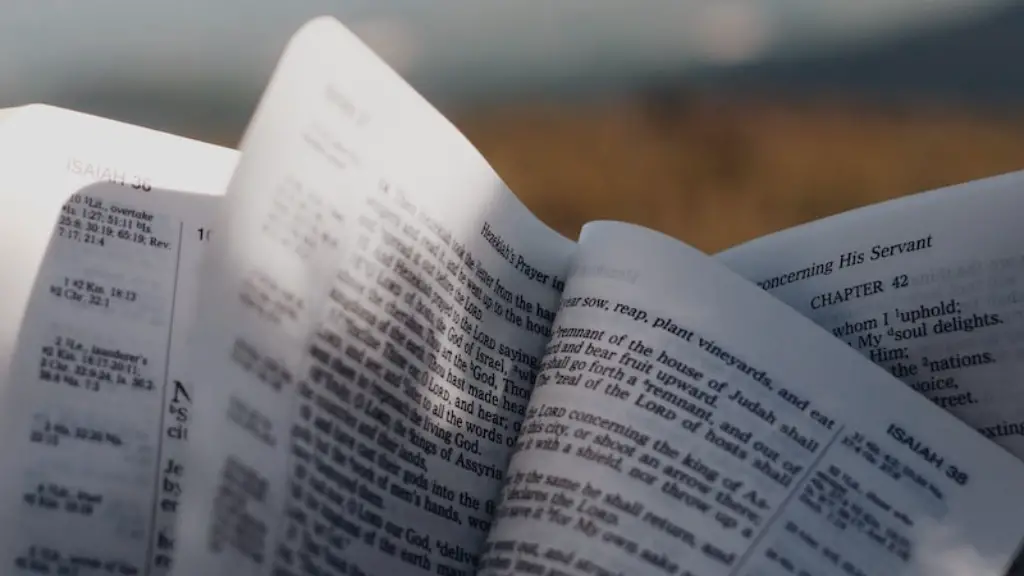Is The Word Sovereign In The Bible?
The concept of sovereignty often underpins much of the world’s political practicalities and government structure. Whether ruled by a monarchy or a democracy, there is usually a sovereign party or body in play. But, is that same concept of sovereignty mirrored in the Bible? Can the idea of “sovereignty” be found in the Bible, or is it more symbolic?
The idea of “sovereignty” in the biblical context is often interpreted as fallowing an omnipotent God. This idea aligns with the entire Bible’s definition of a Creator whose will reigns supreme. “God is sovereign over all that He has made” (Psalm 115:3). This is an example of a particularly direct statement in the Bible with regards to sovereignty, reflecting the fact that God is in total control of his people, his creation, and all that He has laid out in Scripture.
Deeper in the Bible, this concept of Sovereignty is often referenced in terms of God’s power over humanity, us being a people under His authority. In Deuteronomy 32:39 we read, “See now that I, even I, am he, and there is no god with me: I kill, and I make alive; I wound, and I heal: neither is there any that can deliver out of my hand”. This speaks to the ultimate power of God and the complete trust that He is in control of our lives and experiences.
Not only so, but the Bible further paints a picture of a righteous and just God through the concept of sovereignty. His authority is seen in His justice, “He will judge the world in righteousness, and he shall minister judgment to the people in uprightness” (Psalm 9:8). Here, we see the Bible declare its belief in God’s overall justice and mercy through His sovereignty.
These examples of Scripture assert not only the power of God, but also His great love for His people, “As the Father has loved me, so have I loved you: continue you in my love” (John 15:9). Depending on your faith, this idea can be seen as the ultimate authority, a source of comfort when the world seems uncertain. For this reason, the concept of “sovereignty,” and with it, God’s ultimate power, is often comforting to many regardless of religion.
How is Sovereignty Understood in Other Cultures and Religions?
The concept of sovereignty is explored in other religions and cultures across the world. From the Islamic views of Allah’s sovereignty to the Hindu understanding of the divine power of God and its relation to the daily lives of His people. These different interpretations provide different perspectives into how people understand their ultimate ruler and His power.
In particular, philosophical view on sovereignty differ slightly in comparison to the Christian interpretation. Unlike Christianity, which views sovereignty in a literal sense, or a state of being, many philosophical interpretations focus more on the concept of authority or subjectivity. Philosophical views on sovereignty may be around the idea of autonomy or freedom from external interference and from the perspective of the individual.
This difference in perception is evident in the American political life, where the idea of a “sovereign” individual is paramount. This perception is often connected with the founding of the country and the ideas around the in-person power of its citizens. With such interpretation, it’s more about “sovereignty as an individual” rather than a divine source of power.
Implications of Sovereignty
What then do these details around the idea of the word “sovereignty” in the Bible mean when considered together? Depending on your faith, you may view it as unlimited power of God or a reflection of the country’s founding principles. But ultimately, the implications of the concept of a sovereign God or ruler are quite profound. In fact, modern day societies are not too far removed in the idea of a higher power, a concept that is still seen in many popular cultures around the world.
This same idea of a higher power is found in many constitutions and legal systems around the world, from the American accounts of freedom from governance to the European ideologies of elected rulers and governing bodies. The very freedoms and chosen laws many take for granted today are often a direct result of what the Bible speaks about with regards to respect for the autonomy and rule of the highest authority.
What’s more, the idea of a sovereign overlord, be it in religious context or political one, provides a sense of order and justice, especially in times of uncertainty or turmoil. With this in mind, the concept of sovereignty as seen in both the Bible and other influential societies can be looked at as a source of comfort and hope that many rely on today.
Does Sovereignty still Matters in Today’s World?
In this modern day and age, there is much debate around the idea of a higher power or absolute authority. With the technological advancements that have been made in the last century or so, faith and religion have become less of a requirement, while the idea of political sovereignty often comes under question, as democracy and its activists fight for the autonomy of all.
The debate surrounding sovereignty is often connected directly to the idea of ownership, with the Bible citing divine power and modern day societies seeing its citizens with the autonomy to make certain choices. However, with realist ideologies seeing the idea of “sovereignty” as irrelevant, one must ask if this ideal is still relevant in today’s world.
Nevertheless, despite the challenges faced by the concept or idea of a higher power, the idea of a sovereign God and its principles still linger in our minds. Most meaningful religious beliefs still resound with the higher power concept and, in some cases, have become sources of motivation in times of distress.
Even for those not of faith, this idea of sovereignty often finds itself replicated in other aspects of life, from the simple family structure to new technological advancements, from everyday societal laws to cosmic power. Ultimately, the concept of sovereignty remains an ever-present part of the human experience, whether found in the religious context of the Bible or in the modern day world.
Is Sovereignty Relevant Today?
Determining the relevance of sovereignty today relies heavily on one’s perception of the concept, whether determined by faith or by personal philosophy. Regardless, the answer to this question remains a personal journey, as the idea of equality and autonomy can be seen as a right that each person should pursue, while some may feel connected to the idea of an all-knowing greater power.
At the end of the day, it is important to remember the journey and the power gaining a deeper understanding of sovereignty can have on the individual, regardless of ones’ personal beliefs or philosophies. Understanding the power of the higher power concept in today’s society can provide us with a source of hope no matter the circumstance.
Social Repercussions of Sovereignty
The implications of the concept of sovereignty in our current world order and its results remain up for debate, but the undeniable notion is that the idea of a higher power provides many with comfort, especially during times of tension. In fact, the idea of a higher power can often be a catalyst for both positive and negative societal changes.
For instance, countries like India that are largely Hindu-based have often based much of their daily rule on the basic tenets of Hinduism, which include the idea of a higher power, in this case God. All the while, countries such as the United States have moved beyond the idea of a higher power and embraced the idea of equality between all citizens by implementing the concept of democracy.
No matter the implications, the concept of a sovereign power remains an ever present part of the human experience, providing many with an innate sense of comfort and security, while offering an alternate escape or means of understanding in times of distress.
Does a Sovereign Presence Make a Difference?
The question of whether a higher power makes a difference in the current world order remains a personal matter. For some, the sense of a sovereign power brings comfort and safety in times of turmoil. For others, it is the individual freedoms that democracy offers that allows for a voice and agency to make positive change.
At the end of the day, the concept of sovereignty is one that seeks to detail the power of a higher power, one that can origin from different sources and be perceived in endless varied ways.
Nonetheless, understanding the concept of the higher power and allowing it to bring hope and comfort to oneself can have an immensely positive effect in our lives and our societies. In times of uncertainty and distress, it can provide a source of hope that many seek to bring us through even the darkest of days.





